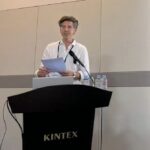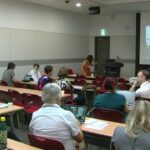Every three years, the International Comparative Literature Association Congress (XXIV ICLA Congress) brings together researchers from around the world who are working in the field of world literature, comparative criticism and transcultural studies. This year, Dongguk University hosted the event in Seoul, Korea, between 18 July and 1 August. The event was attended by roughly 1600 participants and featured renowned keynote speakers, including David Damrosch, Wen-chin Ouyang and Sandra Bermann.
The Institute of World Literature SAS was highly visible thanks to the contributions by Marianna Deganutti, Johannes Kaminski and Eugenia Kelbert Rudan.
Eugenia Kelbert Rudan and Marianna Deganutti have recently established a new ICLA committee, “Language Contact in Literature: Europe”, which was officially launched at the ICLA congress in Seoul. This pivotal event served to clarify the committee’s aims and purposes, as well as to expand its network through two successful sessions that featured nine speakers, including both committee members and external participants. The conference included two panels: “Individual agency and literary language contact” and “The writer as a member of a linguistic community”, along with a presentation on “Language Contact in Literature: Europe” given by our colleagues Kelbert Rudan and Deganutti, which collectively highlighted the committee’s focus and research direction. In addition, we used this occasion to launch and introduce the project’s brand new website (still under construction but already live online), https://languagecontact.sav.sk.
Johannes Kaminski’s contribution was part of the panel “Literature and Science: Conflict, Convergence and Possible Future in Science Fiction”, organized by Professor Yiping Wang from Sichuan University, a partner institution of the Slovak Academy of Sciences. In his presentation, “Mapping Uncertainty: Dialogues between Science Fiction and Future Foresight”, he discussed various fictional and non-fictional approaches to the discussion of the future of humanity. Since the future is discussed in diametrically different terms in Western and Chinese literature, the feedback from the largely Chinese audience allowed him to better understand the function of speculative fiction in a Chinese context. Beyond the presentation, Kaminski established and rekindled meaningful contacts with Canadian, Chinese, Czech and American colleagues.
Program of the congress: https://www.conftool.pro/icla2025/index.php?page=browseSessions&print=export&mode=table

